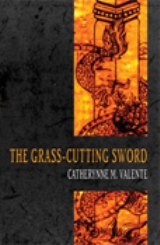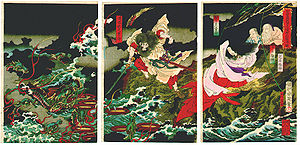
The Grass-Cutting Sword
Encyclopedia
The Grass-Cutting Sword is a novella
by Catherynne M. Valente
. It was published by Prime Books
in 2006.
 The tale is a postmodern interpretation of the Japanese folk-tale of Ame-no-Murakumo-no-Tsurugi ("Heaven's Cloud-Gathering Sword"), which is taken from the collection of folk-lore in the Kojiki
The tale is a postmodern interpretation of the Japanese folk-tale of Ame-no-Murakumo-no-Tsurugi ("Heaven's Cloud-Gathering Sword"), which is taken from the collection of folk-lore in the Kojiki
. The action shifts between the journey of the storm-god Susanoo
who has been banished to earth in human form by his sister, the Sun Goddess Amaterasu
, as he attempts to slay the eight-headed serpent Yamata-no-Orochi. Valente also portrays the serpent's side of the story with a twist; the tale told by Orochi is intercut or added to by the seven maidens who have been sacrificed to the monster.
Novella
A novella is a written, fictional, prose narrative usually longer than a novelette but shorter than a novel. The Science Fiction and Fantasy Writers of America Nebula Awards for science fiction define the novella as having a word count between 17,500 and 40,000...
by Catherynne M. Valente
Catherynne M. Valente
Catherynne M. Valente , is a Tiptree–, Andre Norton–, and Mythopoeic Award–winning novelist, poet, and literary critic. Her short fiction has appeared in Clarkesworld Magazine, the World Fantasy Award–winning anthologies Salon Fantastique and Paper Cities, along with numerous Year's Best volumes...
. It was published by Prime Books
Prime Books
Edited by two-time Hugo-nominee and 2006 World Fantasy-winner Sean Wallace, Prime Books is an award-winning independent publishing house, specializing in a mix of literary/commercial anthologies, collections, novels, and two magazines: Fantasy Magazine and Lightspeed Magazine. Some of its...
in 2006.
Plot summary

Kojiki
is the oldest extant chronicle in Japan, dating from the early 8th century and composed by Ō no Yasumaro at the request of Empress Gemmei. The Kojiki is a collection of myths concerning the origin of the four home islands of Japan, and the Kami...
. The action shifts between the journey of the storm-god Susanoo
Susanoo
, also known as is the Shinto god of the sea and storms. He is also considered to be ruler of Yomi.-Myths:In Japanese mythology, Susanoo, the powerful storm of Summer, is the brother of Amaterasu, the goddess of the sun, and of Tsukuyomi, the god of the moon. All three were born from Izanagi, when...
who has been banished to earth in human form by his sister, the Sun Goddess Amaterasu
Amaterasu
, or is apart of the Japanese myth cycle and also a major deity of the Shinto religion. She is the goddess of the sun, but also of the universe. the name Amaterasu derived from Amateru meaning "shining in heaven." The meaning of her whole name, Amaterasu-ōmikami, is "the great August kami who...
, as he attempts to slay the eight-headed serpent Yamata-no-Orochi. Valente also portrays the serpent's side of the story with a twist; the tale told by Orochi is intercut or added to by the seven maidens who have been sacrificed to the monster.

